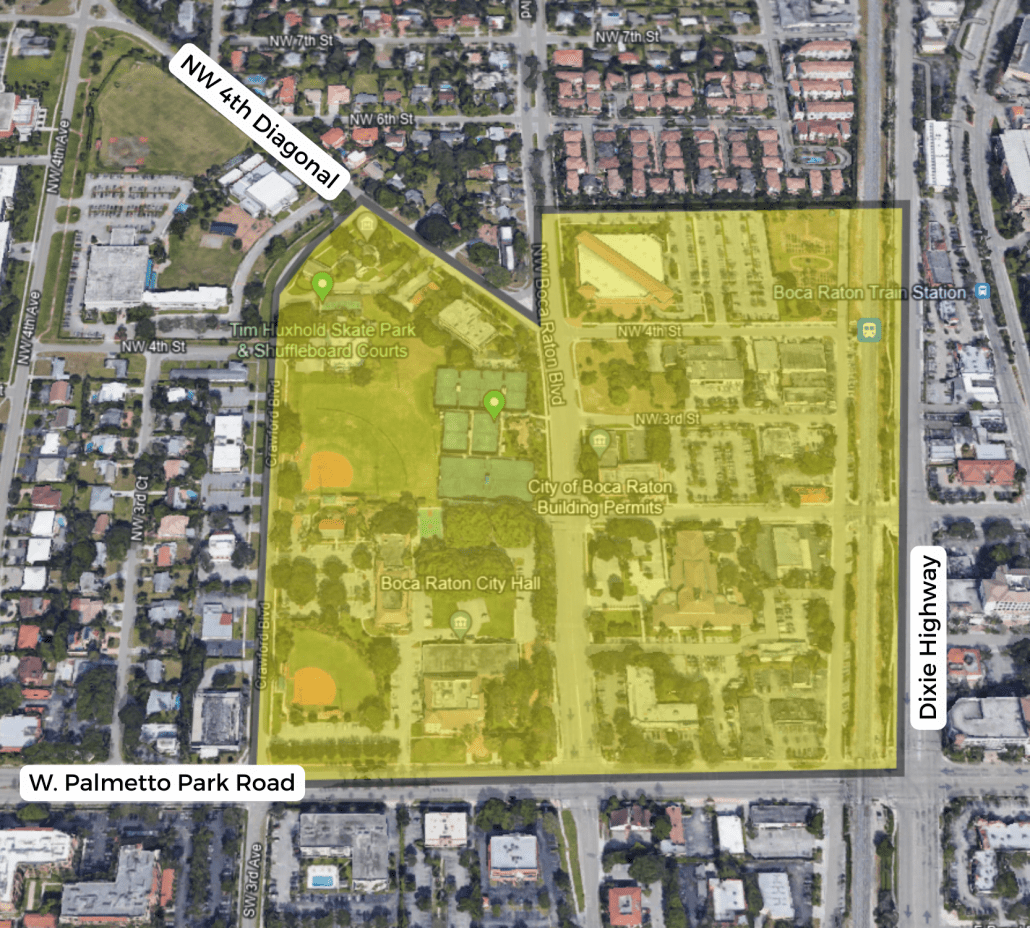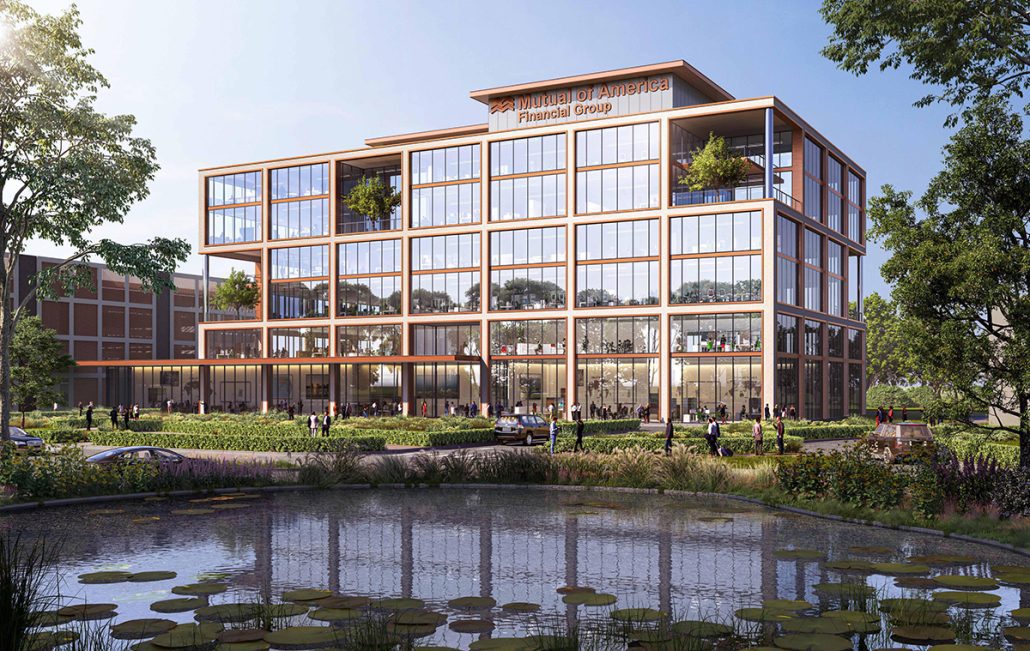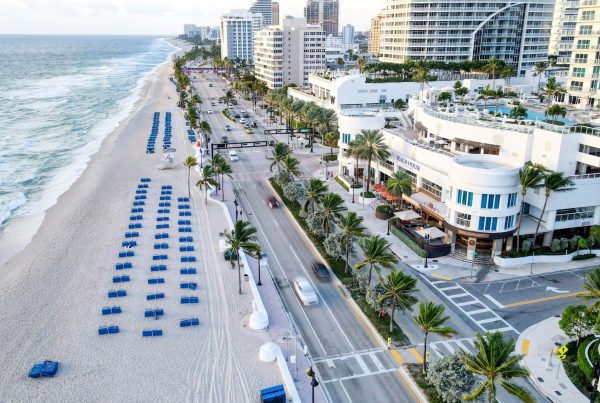Five years ago, Boca Raton City Council members ended discussion of an ambitious redevelopment plan for City Hall and the surrounding area because the projected cost was so high.
Many things have changed since then—enough that the city tonight will begin discussion of an updated plan.
Appropriately, the venue will be the downtown library, on the northeast edge of those roughly 30 acres that straddle Northwest Second Avenue. The forum will be a 6 p.m. meeting of the community advisory panel.
Linda Marenus, a chemistry professor and tutor at Florida Atlantic University, chairs the panel. She told me that the council approached the CAP with the idea of “re-envisioning” the government campus. Residents can rank their priorities, and the panel will send those ideas to the council.

It’s a complicated discussion. The area includes many more public facilities than City Hall. There’s the adjoining community center, the police station, the tennis center, ballfields, a skateboard park, shuffleboard courts and the old library, now home to the building department.
City officials have made one key decision. Boca Raton is moving the Children’s Museum from north of the tennis center to Meadows Park. The city will put the building department’s new home on that site, keeping it separate from City Hall and thus more accessible for the many people who visit each day.
Aside from that, however, the area offers a blank canvas and thus plenty of opportunities. Let’s review what has changed since the last discussion:
Brightline – The station, east of the library, opened in 2022. It offers a new way to bring people to Boca Raton, and council members want to make the most out of it.
Proposals for the City Hall area would go to the council acting as the community redevelopment agency, which oversees downtown. Councilman Marc Wigder chairs the CRA.
Referring to the Brightline station, Wigder said, “We want people to get off, not just get on.” The reasons for people to do that, though, are “difficult to quantify at this time.”
So the apparent goal is not just to create better facilities for residents but also to create attractions for outsiders. That could come from what Wigder called “mixed-use villages” under new zoning tied to the station.
Performing arts center – Five years ago, many residents expressed interest in having such a facility downtown. Now, a private group is raising money to build an arts center in Mizner Park that would include the amphitheater.
Though nothing is final, the group met its first fundraising goal. An arts center thus will not be part of this new discussion, opening space for other projects.
Private investment – In 2017, Related Group proposed building residential units and a parking garage on those 3.6 acres in Mizner Park that would be home to the arts center. In return, a Related official said the company would build a performance venue in the downtown campus.
Opposition was intense. City officials never seriously considered the idea. Now, though, council members want private money to help create that new downtown campus.
Obviously, there is no cost estimate. Five years ago, however, consultants placed it at $200 million and perhaps higher. One element of the consultant’s plan involved redoing streets, which would have pushed the cost higher.
“There is new movement,” Wigder said, “toward P3s,” using shorthand for public-private partnerships. If the city allows new residential near the Brightline station, one condition could be money for city facilities.
Everyone agrees that Boca Raton needs a new city hall and police station. City hall opened in 1964 and, despite renovations, has leaked during bad rainstorms. The police building opened in 1987 and, Wigder said, “is nearing the end of its useful life.”
Beyond those elements are numerous options that could transform that part of the city. Tonight, Marenus said, “We want to start the conversation.”
Delray addresses cyclist safety on AIA

Two weeks ago, a driver plowed into a group of cyclists as they biked on A1A in Gulfstream. With that in mind, several cyclists asked the Delray Beach City Commission during Tuesday’s meeting to improve safety.
There are no bike lanes on that stretch of A1A, which is a state road. The cyclists were headed northbound. The driver, going southbound, veered across the center line. The investigation is not complete.
Delray Beach and Boca Raton recently have made road and sidewalk safety a higher priority. Mayor Shelly Petrolia, who leaves office next month because of term limits, asked that the next commission put A1A “at the top of the list” for projects under the just-approved biker/pedestrian master plan. A consultant put the cost of all projects at $250 million.
Commissioner Ryan Boylston noted that Senate Bill 688 in the Legislature would change the system for allocating money from developer impact fees. Currently, Boylston said, 97 percent of the fees from within Delray Beach go to the county, “which spends most of it out west to support growth.” Only three percent stays with Delray Beach for use within the city.
If the bill became law, cities could keep more of that money. A previous analysis found that local governments—meaning counties—spent too much money on “roadways” and not enough on “mobility.” SB 688 already has passed one committee unanimously. The House version has passed two of the required three committees before a vote of the full House.
Delray to join financial disclosure suit
Speaking of Tallahassee, last year the Legislature required the same financial disclosure for local officials that the state has required for legislators. Reaction has not been favorable.
In some small Palm Beach County cities, a majority of members resigned rather than comply. Previously, elected officials had to disclose a less-detailed summary of their net worth. The new form, among other things, requires detailed disclosure of income sources and debts.
On Tuesday, Delray Beach City Attorney Lynn Gelin asked commissioners whether they wanted to join a lawsuit seeking to overturn the law. A Fort Lauderdale-based firm that has handled many cases for Delray Beach and Boca Raton—Weiss Serota Helfman Cole—would represent the city. Gelin said the firm wants at least 10 plaintiffs. Joining would cost $10,000.
Commissioners agreed. Though the state rule has been in place for roughly three decades, Gelin said the cities will argue that the requirement “is an invasion of privacy.” Petrolia said, “There’s an issue here.” Local officials must file their new forms in July. Those challenging the law would ask for a delay.
Boca Tri-Rail debuts Miami direct rides
Speaking of Boca Raton and mobility, Tri-Rail announced last week that it has begun offering direct service to downtown Miami. Previously, riders had to take one train to northern Miami-Dade County and then another to get farther south.
Tri-Rail’s Boca Raton station, at Yamato Road just west of Interstate 95, consistently has been one of the most popular. Because of that public transit option, the city is allowing more development at the nearby Boca Raton Innovation Campus and Park at Broken Sound.
Several years ago, Boca Raton was set to acquire a second Tri-Rail station on Military Trail near Boca Center. It would have enabled creation of a redeveloped Midtown neighborhood east of Town Center Mall.
But the idea died because of political opposition. Midtown remains a major missed opportunity, and it especially stands out because the current city council would have embraced it.
Mutual of America project requests variation from traffic rules

Speaking of the Park at Broken Sound, I wrote previously about the proposal by Mutual of America to demolish its office in the park and build one three times larger. The project would allow the company to move 200 employees from its New York headquarters and double the size of its local workforce.
The company wants what the city calls “a variation” from traffic rules. The project goes before the planning and zoning board at tonight’s meeting.
Update on the way for FAU president search

According to the agenda for next Thursday’s Board of Governors meeting, State University System Chancellor Ray Rodrigues will provide “an update” on the Florida Atlantic University presidential search.
Also on the agenda is approval of a contract extension for Interim President Stacy Volnick that could keep her in that position through this year. She became the interim at the start of last year. I’ll have more before the meeting.







